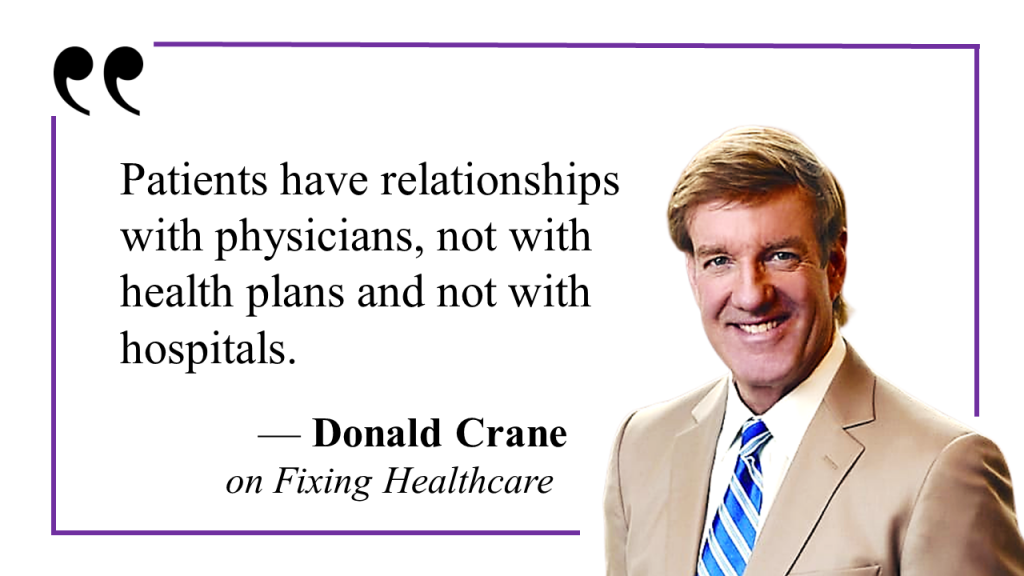Podcast: Play in new window | Download
Subscribe: Spotify | Email | RSS | More
Goodbye, Marcus Welby, M.D., that lovable TV doctor from the early ‘70s whose humble private practice dealt with everything from impotence to Alzheimer’s disease. Hello to integrated, team-based, 21st-century medicine that enables doctors to work smarter, together, rather than harder (and less effectively), alone.
That’s the vision of Don Crane, president and CEO of America’s Physician Groups (APG). Crane is the second guest on season 6 of the Fixing Healthcare podcast. This season, cohosts Dr. Robert Pearl and Jeremy Corr go in search of solutions from people like Crane who lead and represent the healthcare system’s various parts—from doctors and nurses to insurers, drug companies, hospitals, entrepreneurs and others.
APG is a professional association made up of 340 physician groups that contract with about 170,000 physicians who, in turn, take care of 90 million patients in 44 states. In this interview, Crane weighs in re-educating doctors for the future, holding them accountable for better care at lower costs, and improving America’s “toxic” diet.
Donald Crane Interview Highlights
On how to pay for healthcare
“We believe that physician groups should be accountable for cost and quality. We’re very much wedded to the (prospective) payment model, where the physician group is paid in advance per member, per month, a defined amount of money to care for the individual patients. This prospective payment creates aligned incentives all through the physician group enterprise where everybody is trying to keep the patients healthy. Let me repeat that, we try and keep the patient healthy.”
On accelerating the value movement
“I used to go back to Washington, D.C., and talk to congressmen and senators and so forth and say, ‘Fee for service is bad and capitation is good,’ and they were looking at me like I had two heads. Now, when we’re in Washington, D.C., talking about capitation, it’s conventional wisdom; it’s commonly accepted that we need to move there … I think legislation is part of the answer and then I think we need to look to employers clamoring for more value.”
On the causes of physician burnout
“The volume of cries of despair from physicians has risen year over year, and it’s at a high pitch right now … The single biggest cause is the fee-for-service payment model. Physicians needing or wanting to make more money, whether it’s to put children through college or whatever, need to work more in order to make more. So, they’re on the hamster wheel. They run faster and faster and they work longer hours. This is almost a Sisyphus kind of a model of working more, working harder in order to make more money. That is the nature of fee for service.”
“The other part then moves into administrative areas. Indeed, physicians not fortunate enough to be employed by well-staffed and well-resourced groups, they’re having to do a lot of administrative work and they’re trying to keep up with quality measurement programs that vary from payer to payer to payer. There’s a lot of reporting requirements. And so the amount of time they spend in nonpatient care has risen year after year and it’s burning them out. And we need to fix that and fix this payment model.”
On compensating physicians
“[APG] honor(s) physicians. We do, and we feel they should be honored and well compensated. The talk we hear out of Congress about sequesters and reducing physician compensation and physicians are overpaid, just makes my head spin, frankly. We need the best and the brightest. We need to compensate them accordingly. If we don’t, we won’t have the best physician workforce in the world, which I think we presently do. But we’re going to need to take better care of our physicians.”
On restoring the patient-doctor relationship
“Patients have relationships with physicians, not with health plans and not even really with hospitals. So the core of our system is the patient-physician relationship. Those physicians do best when they’re operating in an organized group, where they’re supported by others, whether it’s nurses or nurse practitioners or data analysts, etcetera … And my hope and I guess request or prayer would be that we proliferate this capitated, integrated organized group model across the country just as quick as we can and we will be far better off for having done so.”
READ: Full transcript with Donald Crane
* * *
Hundreds of listeners participated in the 2021 Fixing Healthcare survey and the results offer surprising insights into medicine’s cultural issues. Learn more »
Dr. Robert Pearl is the author of a new book about medicine’s invisible yet highly influential physician culture. Check out “Uncaring: How Physician Culture Is Killing Doctors & Patients.”
Fixing Healthcare is a co-production of Dr. Robert Pearl and Jeremy Corr. Subscribe to the show via Apple, Google, Spotify, Stitcher or wherever you find podcasts. Join the conversation or suggest a guest by following the show on Twitter and LinkedIn.

